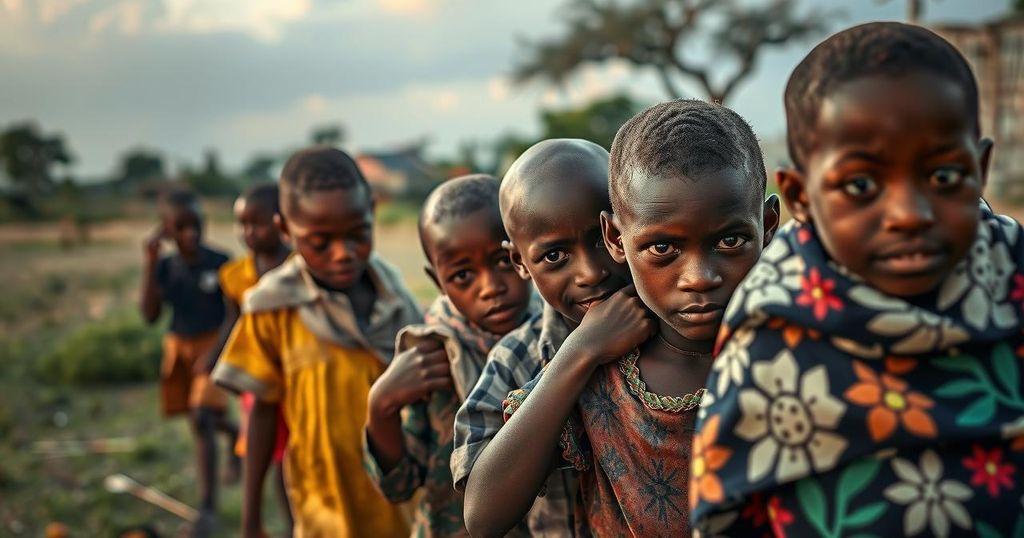Sudan’s Children in Crisis: A Call for Urgent Humanitarian Aid

Sudan faces a dire humanitarian crisis with approximately five million displaced children amid ongoing conflict and starvation. The UN emphasizes the urgent need for aid as local efforts strive to provide basic necessities to affected communities. With increasing challenges and calls for international attention, Sudan’s plight demands immediate action to support its vulnerable population.
In Sudan, the humanitarian crisis continues to spiral out of control, with approximately five million children displaced by conflict and starvation. Mahmoud, a resilient teenager and orphan, embodies the plight of many Sudanese youths who have faced severe adversities as they navigate their harsh reality. The country is experiencing acute food shortages, with famine declared in certain areas while millions face starvation. The United Nations’ Tom Fletcher emphasizes this is an “invisible crisis,” highlighting the urgent need for assistance as he undertakes his mission to draw attention to Sudan’s dire conditions.
The ongoing conflict, primarily between the Sudanese Armed Forces and the paramilitary Rapid Support Forces (RSF), has rendered many national infrastructures ineffective. During his visit to Mahmoud’s orphanage in Kassala, which hosts around a hundred abandoned children, Mr. Fletcher encountered the sobering realities of war. The orphanage, a refuge for displaced youths, has suffered through violence and upheaval since it was forced to relocate due to active fighting in their previous shelter. Mahmoud, despite his circumstances, dreams of being a state governor to facilitate rebuilding efforts.
With over 11 million Sudanese people displaced, finding basic necessities has become a monumental effort. Even as humanitarian agencies strive to deliver food and medical supplies, challenges persist in securing access to the most affected regions. General Abdel Fattah al-Burhan, commander of the Sudanese Armed Forces, has granted permission for the establishment of more aid supply hubs, yet access remains a challenge that necessitates collaboration with the governing authorities.
Critics within the aid community assert that the UN’s recognition of General Burhan’s regime limits the flow of assistance. Nonetheless, Mr. Fletcher maintains that engaging all parties involved in the conflict is crucial for delivering humanitarian aid effectively. Moreover, sexual violence against women in Sudan has surged, prompting urgent measures as the UN aims to spotlight gender-based violence during its global awareness campaign.
Foundation efforts to support single women and orphaned children indicate the resilience of the affected communities. Local organizations led by figures like Nour Hussein al-Sewaty showcase grassroots initiatives to address these pressing needs despite limited resources. Mama Nour urges for assistance, reflecting not only the fatigue of the caretakers but also the collective yearning for international support and solidarity amidst despair.
The civil war in Sudan has led to extreme humanitarian challenges, with millions of children displaced and at risk of starvation. The conflict erupted between the Sudanese Army and the RSF in April 2023, triggering a mass exodus and severe disruption of essential services. International efforts to address the crises are strained, with organizations like the UN striving to navigate complex political and logistical obstacles to aid millions in dire need. This humanitarian crisis is compounded by reports of famine and widespread violence, accentuating the urgency for global attention and action.
The situation in Sudan underscores a grave humanitarian crisis marked by unprecedented levels of displacement and food insecurity, particularly affecting children. Mahmoud’s story exemplifies the resilience seen amid despair, but the reality remains harsh as aid efforts struggle against ongoing violence and logistical challenges. Increased international awareness and coordinated responses are crucial to alleviate suffering and facilitate recovery for the millions affected by this protracted conflict.
Original Source: www.bbc.co.uk








